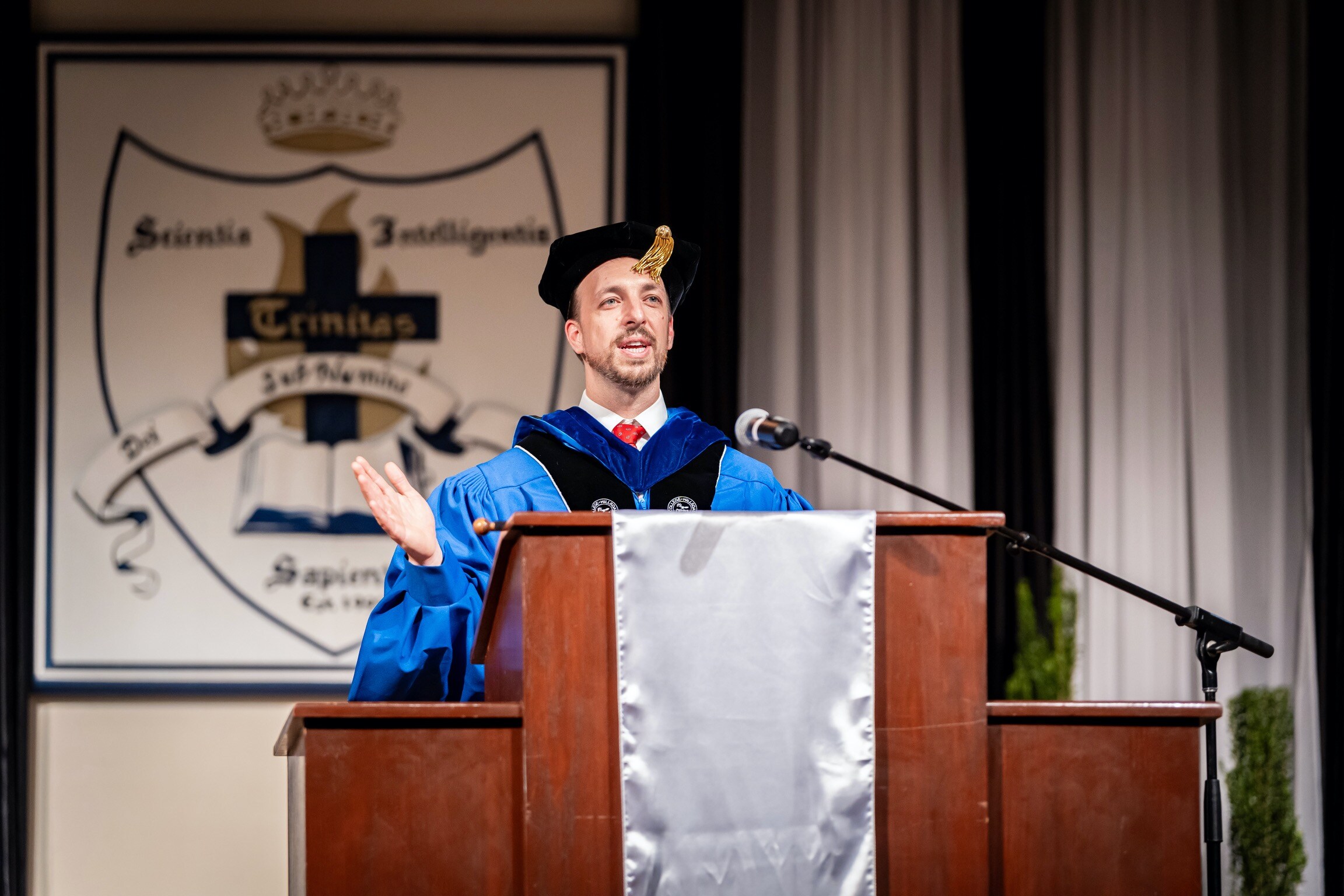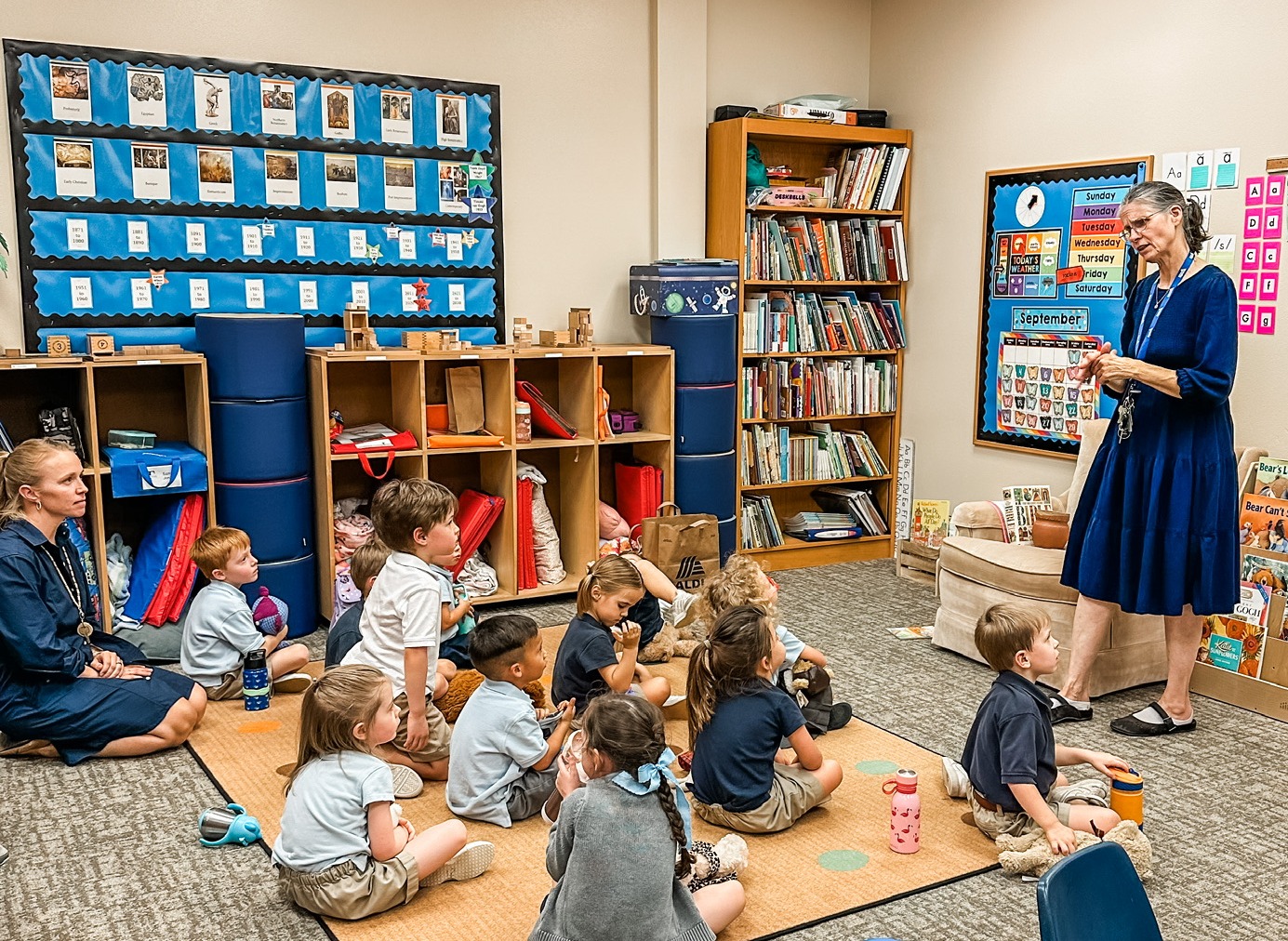The following is adapted from the Commencement Address delivered by Dr. Clifford Humphrey on May 17, 2024, at Trinitas Christian School.
Graduation, the word comes from the Latin verb graduari, meaning to take a gradus, a step. You have made it to the last step, the last rung on the ladder. It’s the end. It feels good, right? Like you can practically retire now and take it easy: this long race you’ve been running is over. But wait: this ceremony is also called commencement. What does that mean? Beginning. Why would we call this ceremony that? What might be beginning now?
Read More
Topics:
Blog Posts,
Classical Education,
Alumni,
Christian Education,
True Education,
Truth, Goodness, and Beauty,
Virtue
People come and people go. That is a truth in any community. It is human nature, I suppose to some extent, for people to get interested in a thing, even convinced about a thing, then lose interest or become unconvinced over time. Maybe we just have a short (and shortening) attention span. Because it is enrollment season, though, and families are deciding whether or not their children ought to attend Trinitas next year, I am spending a few weeks focusing on some of the top reasons people give for losing interest in and leaving Trinitas. This is the third of four such installments, and I hope you find it helpful if you are trying to make an enrollment decision.
Read More
Topics:
Blog Posts,
School Life,
Classical Education,
Alumni,
True Education,
College Admissions,
Reading,
Truth, Goodness, and Beauty,
Admissions
People come and people go. That is a truth in any community. It is human nature, I suppose to some extent, for people to get interested in a thing, even convinced about a thing, then lose interest or become unconvinced over time. Maybe we just have a short (and shortening) attention span. Because it is enrollment season, though, and families are deciding whether or not their children ought to attend Trinitas next year, I am spending the next few weeks focusing on some of the top reasons people give for losing interest in and leaving Trinitas. This is the second of four such installments, and I hope you find it helpful if you are trying to make an enrollment decision.
Read More
Topics:
Blog Posts,
Classical Education,
True Education,
College Admissions,
Mathematics,
Grades,
Admissions
To graduate students who can think clearly, discern wisely, and articulate winsomely classical, Christian schools must have high standards. This means that there will be a striving for excellence in all that we do. With this, we need to be very careful to pay attention to the temptations that come along with this kind of atmosphere. One such temptation that our students may face is setting up idols of perfectionism and putting their worth in their achievements.
Read More
Topics:
Blog Posts,
Parenting,
Classical Education,
Christian Education,
True Education,
Social Issues,
Grades,
Virtue
Last week, we shared ten practical tips for achieving enduring success and experiencing the wonderful fruit of classical Christian education at Trinitas, This week, we have ten MORE practical tips we've assembled from our teachers which we hope will benefit your family.
Read More
Topics:
Blog Posts,
School Life,
Parenting,
Classical Education,
Scripture,
Christian Education,
True Education,
Parent Involvement,
Reading,
Homework,
Truth, Goodness, and Beauty,
Virtue
We should all be familiar with Jesus’ exhortation in Matthew chapter 6 to seek the kingdom of God rather than chase after the things we think we need. He doesn’t say we should forget about the things we think we need—food, clothes, the important stuff—but that those things will be added to us if we will seek first the kingdom of God. The idea seems to be that seeking after food and clothing (and fill in the blank) is something akin to getting so blinded by individual trees that we become unable to see the forest. Or worse: Jesus seems to be cautioning us against a form of idolatry, against letting our material needs (and wants) take the place of God as the focus of our worship and devotion.
Read More
Topics:
Blog Posts,
True Education,
Christian Living,
Teaching,
Grades
The classical school approach offers a fundamentally different vision of education that families fed up with a factory approach to learning find compelling.
Alexandra Desanctis, recently wrote in the National Review of the exponential growth of the classical Christian school movement. What accounts for the growing popularity of these classical and classical Christian schools? Why are so many families opting for a return to an older way of educating their children? Strange as it may seem, I believe this classic Chipotle video helps explain the reasons for the rapid spread of these schools.
Read More
Topics:
Blog Posts,
Classical Education,
True Education,
Secular Education,
Social Issues
As Trinitas begins its 25th year of providing classical and Christian education for like-minded families, it's a good time to remind each other that Trinitas serves parents in the mission God has given them for the education of their children without replacing them altogether. Yes, our experienced and gifted faculty do have the enormous responsibility and opportunity of taking the lead in students' education for the next 174 school days, but they are not replacing the role of the parents nor are parents mindlessly handing their children over to the school. Both are working together to be faithful instruments of grace in the education of the student.
Read More
Topics:
Blog Posts,
True Education,
Parent Involvement


-1.png)


.jpg)



